
October 24
1648 Thirty Years War ends:
The Treaty of Westphalia is signed, ending the Thirty Years War and radically shifting the balance of power in Europe.
The Thirty Years War, a series of wars fought by European nations for various reasons, ignited in 1618 over an attempt by the king of Bohemia (the future Holy Roman emperor Ferdinand II) to impose Catholicism throughout his domains. Protestant nobles rebelled, and by the 1630s most of continental Europe was at war.
As a result of the Treaty of Westphalia, the Netherlands gained independence from Spain, Sweden gained control of the Baltic and France was acknowledged as the preeminent Western power. The power of the Holy Roman Emperor was broken and the German states were again able to determine the religion of their lands.
The principle of state sovereignty emerged as a result of the Treaty of Westphalia and serves as the basis for the modern system of nation-states. (History.com)
1795 Third Partition of Poland: The Polish-Lithuanian Commonwealth ceases to exist as an independent state as its territory is divided between Austria, Prussia, and Russia. [For further information, click here]
1883 Birth: Walter Buch: Chairman of the Supreme Party Court of the NSDAP and father-in-law of Martin Bormann. Sentenced to five years in a labor camp after the war, Buch is believed to have committed suicide in 1949 by slashing his wrists and drowning himself in Ammer Lake. 

1915 World War I (Oct 4, 1915 - Feb 29, 1916): Gefreiter Adolf Hitler's serves with 16 Reserve Infantry Regiment at Fromelles. [For further details, Click here.]
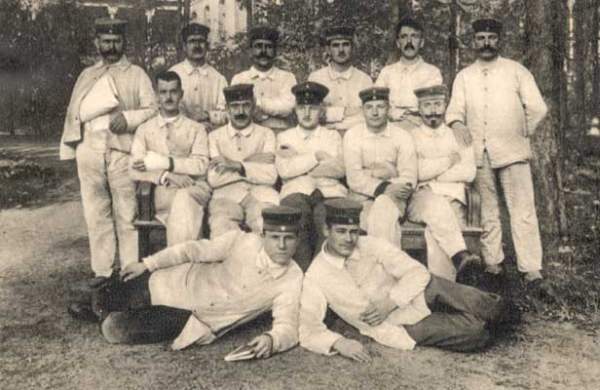
1917 Various:
World War I: The Battle of Caporetto begins:
Austro-Hungarian forces, reinforced by German units, were able to break into the Italian front line and rout the Italian army, which had practically no mobile reserves. The battle was a demonstration of the effectiveness of the use of stormtroopers and the infiltration tactics developed in part by Oskar von Hutier. The use of poison gas by the Germans played a key role in the collapse of the Italian Second Army. [For further details, Click here.]
Russian Revolution: Lenin's Statement of Bolshevik Demands:
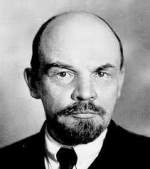
The Councils of Workers', Soldiers' and Peasants' Delegates must at once take every practicable and feasible step for the realization of the Socialist program. The Bolsheviki demand a republic of the Councils of Workers', Soldiers' and Peasants' Delegates; abolition of the standing army and the police, substituting for them an armed people; officials to be not only elected but also subject to recall and their pay not to exceed that of a good worker. [For further details, Click here]
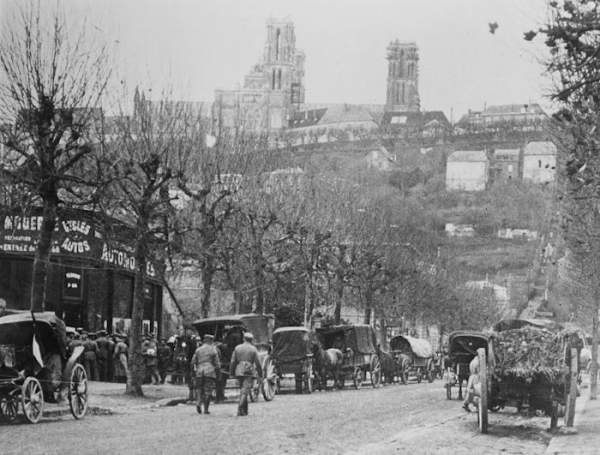
1918 World War I: Italian forces attack Austrian positions in Italy at the Battle of Vittorio Veneto, but are quickly halted on the Piave River line.
The attack opened on 23 October 1918 with an Italian advance in the mountains. However the extent of Austro-Hungarian resistance surprised Diaz and succeeded in preventing any significant Italian gains, although the Austro-Hungarians were obliged to bring up reserves from the Lower Piave. Such reserves could be ill-afforded given that the main Italian advance began the same day. [For further details, Click here]
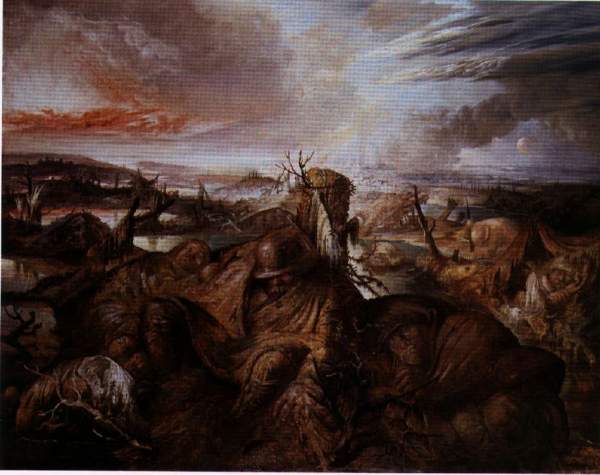
1918 World War I (Oct 15 - Nov 10): Gefreiter Adolf Hitler, blinded in a gas attack near Werwick on Oct 14, recovers in the Prussian Reserve Hospital at Pasewalk near Berlin. The doctors at this army hospital, on the cutting edge of medical treatments for gassed soldiers, provide Hitler with very good care, and his sight slowly and painfully begins to return to him over these few weeks. Hitler falls into a deep depression. After over four years on the front lines, his fighting days are over. In four years of war, the List Regiment has lost 3,754 dead, 8,795 wounded, with 678 taken prisoner. This is somewhat above the average for the German Armed Forces as a whole.
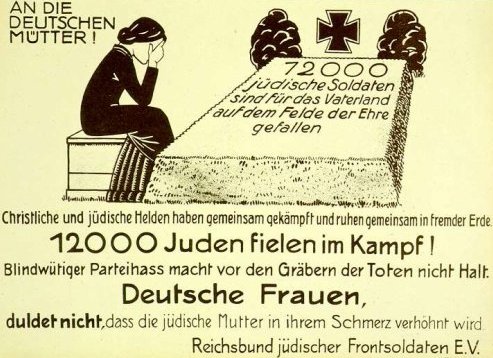
Throughout the length of the war, fifty-nine Jews served in the List Regiment, sixteen of these as officers. Thirty percent of the Jews in the List Regiment were honored for bravery, and seventeen percent were killed in action.[For further details, Click here.]
1923 Weimar: 14 policemen are killed and 100 wounded during a Communist insurrection in Hamburg. (THP)

1929 Black Thursday: The New York Stock Exchange crashes, quickly setting off a worldwide economic depression. Investors who had been "buying stock on margin," are devastated when their "24-hour broker call loans" are all called in at the same time. This means that the stock brokers and their customers have to dump their stocks in order to pay off their loans. Put simply, when all the sellers offer their stock at the same time, prices plummet.
Winston Churchill is personally brought to the New York Stock Exchange by Bernard Baruch. Some conspiracy-oriented historians are convinced that Churchill is brought to witness the crash firsthand because it is desired that he see the power of the banking system at work. (THP)
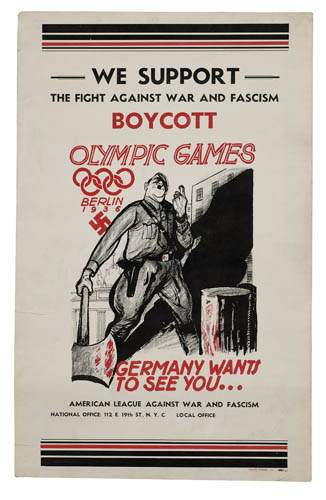
1935 Olympics: Catholic and Protestant leaders urge America not to participate in the 1936 Olympics in Berlin.

1938 German Foreign Minister Joachim von Ribbentrop and Polish Ambassador Lipski meet at Berchtesgaden. Ribbentrop invites Polish Foreign Minister Beck to visit Berlin and puts forward the following suggestions:
(1) Danzig to be a German city.
(2) Free port for Poland in Danzig with communications assured by extraterritorial railroad and highway through Danzig.
(3) An Extraterritorial zone one kilometer wide for a railroad and highway across the Polish Corridor uniting the two portions of Germany carved out at Versailles.
(4) Both nations to recognize and guarantee their frontiers.
(5) An extension of the German-Polish treaty of Friendship.
1940 World War II: Hitler meets General Petain at Montoire: Petain rejects the idea of a Franco-German military alliance:
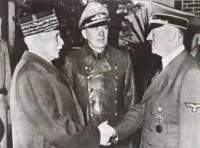
When Hitler met Petain at Montoire in October 1940 to discuss Vichy's role in the new European Order, the Marshal "listened to Hitler in silence. Not once did he offer a sympathetic word for Germany". However, Vichy France remained neutral as a state, albeit opposed to the Free French. After the British attack on Mers el Kébir and Dakar, Petain took the initiative to collaborate with the occupiers.
1941 Various:
World War II - Barbarossa: Kharkov falls to the Wehrmacht, netting yet another Russian Army Group. Heeresgruppe Mitte (von Bock) capture Charkov and Belgorod.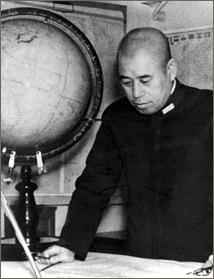
Admiral Yamamoto to newly appointed Navy Minister Shimada:
After much study, therefore, I have come to the opinion that the only way is to have a powerful air force strike deep at the enemy's heart at the very beginning of the war and thus deal a blow, material and moral, from which it will not be able to recover for some time. Judging from Admiral Kimmel's character and the recent trend of thought in the American Navy, it does not appear likely that the American Navy will necessarily confine itself to the strategy of a steady frontal offensive. And when I think what the strength of our homeland defense will be while the southern operations are in progress. I cannot but be truly apprehensive. [For the full text, Click here.]
[See: Countdown to Infamy: Timeline to Pearl Harbor.]
From the Diary of Rear Admiral Giichi Nakahara:
The United States has announced that the States has now 4 naval bases under construction in England. Again it is reported that another American merchant marine ship was sunk on the Atlantic by attack. The United States made it clear that to transport materials for aiding the USSR through Vladivostok would be stopped. (I wonder if it could be done through Archangel?) Moscow, Kharkov, and Rostov are facing a real crisis.
1942 World War II: Poland: The Cafe Club (German recreation center in Warsaw) is bombed by Polish People's Guard in retaliation for public execution of 50 Poles. (See Oct 20)
1943 World War II: Various: Anti-Nazi Clandestine Radio
Russian Front: The Red Army achieves a breakthrough on the Dnepr river and captures Melitopol.
1944 World War II: War in the Pacific: The aircraft carrier USS Princeton is sunk by a single Japanese plane during the last day of Battle of Leyte Gulf.
Shortly before 1000, a lone enemy dive-bomber came out of the clouds above Princeton. At 1500 feet the pilot released his bomb. It hit between the elevators , crashed through the flight deck and hanger, then exploded. Initial fires soon expanded as further explosions sent black smoke rolling off the flight deck and red flames along the sides from the island to the stern. Covering vessels provided rescue and fire-fighting assistance and shielded the stricken carrier from further attack. [For further details, Click here]
1945 United Nations: U.N. formally established:
Less than two months after the end of World War II, the United Nations is formally established with the ratification of the United Nations Charter by the five permanent members of the Security Council and a majority of other signatories.
Despite the failure of the League of Nations in arbitrating the conflicts that led up to World War II, the Allies as early as 1941 proposed establishing a new international body to maintain peace in the postwar world. The idea of the United Nations began to be articulated in August 1941, when U.S. President Franklin D. Roosevelt and British Prime Minister Winston Churchill signed the Atlantic Charter, which proposed a set of principles for international collaboration in maintaining peace and security. Later that year, Roosevelt coined "United Nations" to describe the nations allied against the Axis powers—Germany, Italy, and Japan. The term was first officially used on January 1, 1942, when representatives of 26 Allied nations met in Washington, D.C., and signed the Declaration by the United Nations, which endorsed the Atlantic Charter and presented the united war aims of the Allies.
In October 1943, the major Allied powers--Great Britain, the United States, the USSR, and China—met in Moscow and issued the Moscow Declaration, which officially stated the need for an international organization to replace the League of Nations. That goal was reaffirmed at the Allied conference in Tehran in December 1943, and in August 1944 Great Britain, the United States, the USSR, and China met at the Dumbarton Oaks estate in Washington, D.C., to lay the groundwork for the United Nations. During seven weeks, the delegates sketched out the form of the world body but often disagreed over issues of membership and voting. Compromise was reached by the "Big Three"-the United States, Britain, and the USSR-at the Yalta Conference in February 1945, and all countries that had adhered to the 1942 Declaration by the United Nations were invited to the United Nations founding conference.
On April 25, 1945, the United Nations Conference on International Organization convened in San Francisco with 50 nations represented. Three months later, during which time Germany had surrendered, the final Charter of the United Nations was unanimously adopted and signed by the delegates. The Charter called for the U.N. to maintain international peace and security, promote social progress and better standards of life, strengthen international law, and promote the expansion of human rights.
On October 24, 1945, the U.N. Charter came into force upon its ratification by the five permanent members of the Security Council and a majority of other signatories. The first U.N. General Assembly, with 51 nations represented, opened in London on January 10, 1946. On October 24, 1949, exactly four years after the United Nations Charter went into effect, the cornerstone was laid for the present United Nations headquarters, located in New York City. Since 1945, the Nobel Peace Prize has been awarded five times to the United Nations and its organizations and five times to individual U.N. officials. (History.com)

1945 Death: Vidkun Quisling is executed by a firing squad in Norway. [For further details, Click here]
1946 Various: Death: Robert Ley: Hitler's 'Labor Leader', commits suicide in Allied captivity. His suicide note reads (in part):
I have always been one of the responsible men. I was with Hitler in the good days...I wanted to be with him in the black days. God led me in whatever I did. He led me up and now he lets me fall. I am torturing myself to find the reasons for my downfall, and this is the result of my contemplation's. We have forsaken God and therefore were forsaken by God. Anti-Semitism distorted our outlook and we made grave errors. It is hard to admit these mistakes but the whole existence of our people is in question. We Nazis must have the courage to rid ourselves of Anti-Semitism. We have to declare to our youth that it was a mistake. The youth will not believe our opponents. We have to meet the Jews with open hearts. German people, reconcile yourselves with the Jew. Invite him into your home with you. We cannot stop the excited sea at once but must let her calm down gradually, otherwise terrible repercussions would result. A complete reconciliation with the Jews has priority over economic or cultural reconstruction. We outspoken Anti-Semites have to become the first fighters for the new ideas. We have to show the people the way.
Note: Goering, upon hearing of Ley's suicide, remarks, "It's just as well that he's dead, because I had my doubts how he would behave at the [Nuremberg War Crimes] trial.
Death: Kurt Dluege: Commander-in-Chief of the Police of the German Reich and later Deputy Protector of Bohemia and Moravia. Daluege joined the NSDAP in 1922 and in March 1926 founded and led the first SA group in Berlin and North Germany, a position he held until 1928, when he transferred to the SS. For the next five years he was Commander of SS units in East Germany, organizing special shock battalions for surprise attacks on opponents. After Hitler came to power in 1933, he was given the special assignment of purging the police apparatus of Hitler's opponents, and was largely responsible for turning the police into an instrument of the Nazi regime. Promoted to SS General in 1934, he subsequently became the most powerful policeman in the SS, second in rank only to Himmler. After Heydrich's death, he became Deputy Protector of Bohemia and Moravia in 1942, and was said to have been responsible for the destruction of the village of Lidice. He is executed by the Czechs this day. [For further details, Click here]
1948 Spandau Prison: From Spandau: The Secret Diaries, by Albert Speer:
The medical aide brings a basketful of thirty new books from the Spandau Municipal Library. Raeder with his assistant librarian, Schirach, has been busy for an hour entering the books in a registry that he keeps with such care that one might think he is administering thirty battleships instead of that many books.
1951 Truman declares war with Germany officially over:

On this day in 1951, President Harry Truman finally proclaims that the nation's war with Germany, begun in 1941, is officially over. Fighting had ended in the spring of 1945.
Most Americans assumed that the war with Germany had ended with the cessation of hostilities six years earlier. In fact, a treaty with Germany had not been signed. Complicating the treaty process was the status of territory within what was formerly the German state. Following the Second World War, the major Western powers (U.S., Britain and France) and the Soviets agreed to divide the country, including the capital city of Berlin, into democratic and communist-controlled sectors. Both East and West Berlin ended up within the Soviet-controlled territory of East Germany and the capital became the epicenter of increasing tensions between the West and Soviet Russia. Each side claimed the other had violated post-war treaties regarding their respective spheres of influence in post-war Europe. The conflict over Berlin came to a head in June 1948 when Stalin ordered a blockade of the city. Truman did not want to abandon Berlin to the Soviets and ordered an airlift to supply the western sectors with food and fuel. The treaty process was put on hold until the Western powers could agree on what to do about Berlin. A Soviet atomic weapons test on October 3, 1951, increased the tension.
In his proclamation on this day, Truman stated that it had always been America's hope to create a treaty of peace with the government of a united and free Germany, but that Soviet policy had "made it impossible." The official end to the war came 10 years and two months after Congress had declared open war with Nazi Germany on December 11, 1941. (History.com)
1954 Birth: Walter John Loepp Jr., founder of The Propagander Pages.
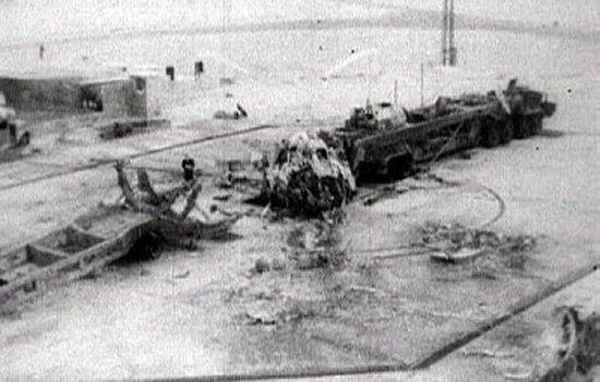
1960: The Nedelin Disaster occurs when a prototype of the Soviet R-16 ICBM missile, which is being prepared for a test flight, explodes on the launch pad. The official death toll is 90, but estimates are as high as 150, with 120 being the generally accepted figure. Despite the magnitude of the disaster, news of it will be covered up for many years. The Soviet government will not acknowledge the event until 1989. Strategic Rocket Forces Marshal Mitrofan Nedelin, the commander of the R-16 development program, is among those killed in the explosion and fire. The subsequent delay to the R-16 program will spur the USSR toward the development of more effective ICBMs and will spark Khrushchev's decision to install IRBM's in Cuba.
[See: Wunderwaffen: Hitler's Deception and the History of Rocketry.]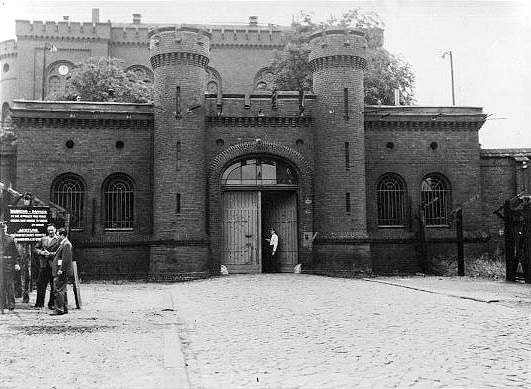
1964 Spandau Prison: From Spandau: The Secret Diaries, by Albert Speer: For several months Hess has been fighting for the right to make good-sized extracts from his reading. He asked for large batches of writing paper for this purpose, but so far his requests have been turned down. Today he made his request to the French general virtually in the form of an ultimatum. "I have no objection to my papers being censored," he declared in an angry tone, "and I would even allow the extracts to be burned later on. But I want to keep my notes together for a fairly long time, so as to be able to go over them. That is not possible with these few small notebooks." When Hess's tone became vehement and excited, the general abruptly left the cell. But he stared stunned at the director when the latter confirmed that all our notes are collected from time to time and destroyed by machine. "Is that so?" he asked, surprised and disturbed, and turned away, shaking his head.
Edited by Levi Bookin (Copy editor) Click to join 3rdReichStudies Disclaimer: This site includes diverse and controversial materials--such as excerpts from the writings of racists and anti-Semites--so that its readers can learn the nature and extent of hate and anti-Semitic discourse. It is our sincere belief that only the informed citizen can prevail over the ignorance of Racialist "thought." Far from approving these writings, this site condemns racism in all of its forms and manifestations.
levi.bookin@gmail.com










Fair Use Notice: This site may contain copyrighted material the use of which has not always been specifically authorized by the copyright owner. We are making such material available in our efforts to advance understanding of historical, political, human rights, economic, democracy, scientific, environmental, and social justice issues, etc. We believe this constitutes a "fair use" of any such copyrighted material as provided for in section 107 of the US Copyright Law. In accordance with Title 17 U.S.C. Section 107, the material on this site is distributed without profit to those who have expressed a prior interest in receiving the included information for research and educational purposes. If you wish to use copyrighted material from this site for purposes of your own that go beyond 'fair use', you must obtain permission from the copyright owner.
Please Note: The list-owner and the moderator of 3rdReichStudies are not responsible for, and do not necessarily approve of, the random ads placed on our pages by our web server. They are the unfortunate price one pays for a 'free' website.



